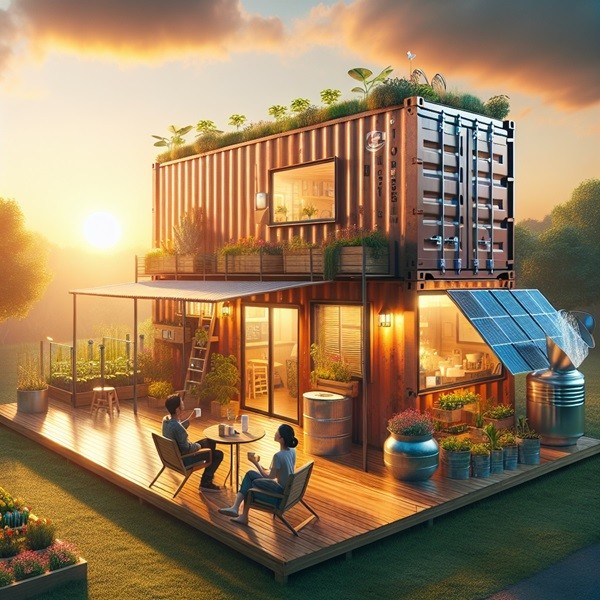
Key Takeaways
- Zoning laws in Indiana may vary by municipality, so it’s crucial to check local regulations before planning your shipping container home.
- Permits are necessary for constructing a shipping container home, and ensuring compliance with building codes is a must.
- Container homes must meet specific safety standards and pass inspections, just like any other dwelling.
- Homeowners Associations (HOAs) may have their own rules regarding the construction of shipping container homes within their governed communities.
- Eco-friendly and sustainable living through shipping container homes can be incentivized by local regulations, but environmental compliance is key.
Turning Containers into Comfort: Your Indiana Home
Transforming a shipping container into a cozy and habitable space is an exciting journey. But before you dive into the design and decor, you need to navigate through the legal landscape. In Indiana, as in any other place, this means understanding zoning laws, building permits, and regulations that apply to shipping container homes.
The Appeal of Shipping Container Homes
Shipping container homes have captured the imagination of many looking for a sustainable, cost-effective, and unique living space. Their modular nature allows for innovative design and a smaller carbon footprint. Not to mention, they can be significantly more affordable than traditional construction.
My Favorite Container Homes Resource
I compared the top 3 Container Home Guides
to discover the ultimate resource!
See my top recommendation here
Indiana’s Take on Alternative Housing
Indiana is known for its welcoming attitude towards innovation and sustainable living. This extends to the housing sector, where shipping container homes are becoming a more visible part of the landscape. Indiana’s diverse climate, ranging from humid summers to chilly winters, makes it an excellent testing ground for the resilience and adaptability of container homes.
Understanding Indiana’s Zoning Laws
What Zoning Laws Mean for Your Container Home
First things first, you’ll need to check with your local zoning office. Zoning laws dictate what types of structures can be built on which parcels of land. These laws are in place to ensure safety, to control population density, and to make sure that the use of the land aligns with the community’s plans.
Residential vs. Industrial: Knowing Your Zone
Most areas are zoned as residential, commercial, or industrial. For shipping container homes, you’ll typically be looking at residential zoning, but some areas might allow for mixed-use or even have specific guidelines for alternative housing. It’s all about the location and the specific rules that apply there.
Navigating Building Permits and Regulations
Permit Requirements for Shipping Container Homes
Once you’ve confirmed that your property is zoned appropriately, the next step is obtaining the necessary permits. This usually involves submitting your building plans for approval and demonstrating that your home will be up to code.
“Remember, the permit process is there to ensure that your home is safe and sound. It’s not just a bureaucratic hurdle; it’s a vital step in the construction process.”
Here’s what you typically need to do:
- Draw up detailed plans of your container home.
- Submit these plans to your local building department.
- Pay any applicable fees for the review process.
- Address any concerns or changes requested by the building department.
- Obtain your permit before starting construction.
Building Code Compliance for Container Structures
Building codes are a set of standards for the construction of buildings that help ensure public health, safety, and welfare. Shipping container homes are no exception. In Indiana, these homes must comply with the International Building Code (IBC), which was updated to include provisions for container homes in 2021.
Most importantly, building codes cover aspects like structural integrity, fire safety, and energy efficiency. Because shipping containers are not originally designed for human habitation, there are special considerations to make them livable, such as proper
Therefore, to ensure your container home is up to code, you will need to work with a qualified architect or builder familiar with these unique challenges. Besides that, you’ll need to schedule inspections during construction to verify that the work meets the required standards.
Stay tuned for the next section where we will delve deeper into structuring your shipping container home legally, dealing with HOAs, and ensuring your home is eco-friendly and compliant with environmental regulations.
Summary of Container Homes Rules in Indiana
References:
- Legalities of Shipping Container Homes in Indiana – Sea Can Fox
- City Council ships it: Container homes approved in Fort Wayne | WANE 15
- Shipping Container Permits, Zoning Laws, and Building Codes
Structuring Your Shipping Container Home Legally
Creating a shipping container home is not just about placing a container on a plot of land and moving in. It requires careful planning and adherence to local laws and regulations to ensure that your home is not only unique but also legal and safe.
Let’s break down the steps you need to take to ensure your shipping container home meets all legal requirements.
Marrying Aesthetics with Legalities
When you’re designing your container home, it’s not just about the look. You have to marry aesthetics with legalities. This means that every design element must be scrutinized for both its beauty and its compliance with building codes.
For instance, those large, floor-to-ceiling windows that flood your home with light? They need to be energy-efficient and possibly tempered for safety. The sleek rooftop deck? It must have guardrails at the correct height. It’s these details that will ensure your home is both stunning and structurally sound.
Inspections and Safety Standards
Inspections are a critical part of the building process. They are there to ensure that every phase of construction adheres to safety standards. In Indiana, your shipping container home will likely go through several inspections:
- Foundation Inspection: Before you pour concrete or set piers, an inspector will check the ground and forms to ensure they are up to code.
- Framing Inspection: Once the container is placed and secured, an inspector will look at the framing and modifications to ensure everything is structurally sound.
- Plumbing, Electrical, and HVAC Inspections: These are typically done after installation but before the walls are closed up, so the inspector can see the work.
- Final Inspection: After construction is complete, the final inspection confirms that the home meets all building codes and is safe for occupancy.
Passing these inspections is non-negotiable; they are what allow you to move forward at each stage of the build.
Installing Utilities in Compliance with Codes
Utility installation in a shipping container home is not much different from any other house, but there are some nuances. You need to ensure that your electrical system can handle the load of your appliances and that your plumbing system is properly vented and sloped to prevent backflow. Also, HVAC systems must be sized appropriately for the space to ensure efficient heating and cooling.
Working with licensed professionals is the best way to ensure that your utilities are installed in compliance with local codes and regulations.
Dealing with Homeowners Associations (HOAs)
Understanding Your HOA’s Stance on Container Homes
If you’re planning to build in a community with an HOA, it’s crucial to understand their stance on container homes. HOAs have their own sets of rules, which may include restrictions on the types of structures allowed, exterior finishes, and even roof lines.
Before you buy land or start planning your build, check the HOA’s covenants, conditions, and restrictions (CC&Rs) to see if container homes are permitted.
Seeking Approval and Meeting HOA Requirements
If you find that container homes are allowed, or if there’s some wiggle room, your next step is to seek approval from the HOA board. This typically involves:
- Presenting your design plans for the home.
- Providing samples of exterior materials.
- Showing how your home will fit into the community aesthetically.
Getting the green light from your HOA before you begin construction can save you from potential legal headaches down the road.
Sustainable Living and Environmental Regulations
Eco-Friendly Benefits and Legal Incentives
Shipping container homes are often praised for their sustainability. They repurpose existing materials, can have a smaller footprint, and are conducive to green technologies like solar panels and rainwater harvesting.
Indiana may offer incentives for building green homes, such as tax credits or rebates for energy-efficient appliances. These incentives can make a container home even more appealing from a financial standpoint.
Ensuring Environmental Compliance
But sustainability isn’t just about the benefits; it’s also about compliance. You need to ensure that your home meets any environmental regulations in place. This could include:
- Proper insulation to reduce energy consumption.
- Low-flow fixtures to conserve water.
- Using materials that don’t emit harmful chemicals.
By following these guidelines, you’re not just creating a home; you’re contributing to a healthier environment.
Successful Container Homes in Indiana
Success lies in preparation and partnership with local authorities:
- Start the planning process early, and be prepared for it to take longer than you expect.
- Engage with your local planning and zoning offices from the outset.
- Hire professionals who have experience with container homes and local building codes.
Due diligence and the willingness to work within the legal framework is crucial to achieving your dream home.

Frequently Asked Questions (FAQ)
Can I Build a Shipping Container Home Anywhere in Indiana?
While Indiana is generally supportive of alternative housing, you can’t build a shipping container home just anywhere. You must comply with local zoning laws, which can vary widely from one municipality to another. Always check with your local planning department first.
What Are the Common Legal Roadblocks for Container Homes?
The most common legal roadblocks include zoning restrictions, building code compliance, and sometimes, HOA regulations. Overcoming these challenges typically involves a combination of careful planning, community engagement, and legal consultation.
How Can I Ensure My Shipping Container Home is Up to Code?
Ensuring your container home is up to code involves working with knowledgeable architects and builders, familiarizing yourself with the International Building Code as it applies to container homes, and staying on top of local amendments or updates to building regulations.
Are There Prefabricated Shipping Container Homes Available in Indiana?
Yes, there are companies in Indiana that specialize in the construction of prefabricated shipping container homes. These homes are designed to meet building codes and can be a more straightforward option for those looking to join the container home movement.
Can Shipping Container Homes Withstand Indiana Weather?
With the right design and construction, shipping container homes can withstand Indiana’s weather, including heavy snow and high winds. It’s crucial to include proper insulation, weatherproofing, and structural reinforcements in your building plans.
Ultimately,





